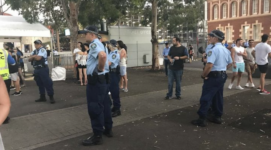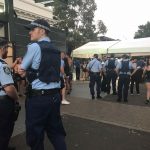NSW Police Under Fire for Illegally Conducting Warrantless Searches

The practice of searches by New South Wales police officers without a valid warrant is again under fire, and for good reason.
New figures have come to light which reveal that police officers in our state stop and search an average of 550 people and vehicles without a warrant on a daily basis.
A whopping 18 percent of those who are stopped and searched are Indigenous, despite comprising just 3% of the Australian population.
Of concern is the fact these searches turn up nothing at all nearly 90 per cent of the time, suggesting many are being undertaken without sufficient basis or, to put it in legal terms, without police having a suspicion on reasonable grounds that a person is in possession of a stolen or otherwise unlawfully obtained item, or an illicit substance, or if they have a dangerous weapon relating to a crime, or anything else used or intended to be used in the commission of an offence.
Since 2003 / 2004, the number of searches has ballooned six-fold, and the reasons for this include the heavy-handed policing tactics implemented during COVID as well as policing quotas – targets relating to searches, arrests and fines that police officers are encouraged to meet.
While COVID has subsided and the force abandoned quotas in 2022, the culture of over-policing evidently persists.
Racism and police searches
Recently published analysis of figures obtained via Freedom of Information requests from NSW Police, and from the NSW Bureau of Crime Statistics and Research (BOCSAR).
The numbers show that lower socioeconomic, migrant and Indigenous areas are often searched at higher rates, despite searches being no more likely to find anything.
The suburb of Liverpool in Sydney ranks as having the third-highest number of searches in the state, and the statistics also show (as they do elsewhere across the state) that Indigenous people in Liverpool are more likely than non-Indigenous people to be searched.
For example, indigenous people made up more than 90 percent of total search numbers in the local government area of Bourke, and around 75 percent of searches in Dubbo and Moree Plains.
The statistics also show that despite the fact that quotas no longer exist, in Mt Druitt, Blacktown and Parramatta, police searches climbed by 59 per cent, 72 per cent, and 78 per cent in the five years to 2023.
Despite some damaging high profile press, and an inquiry by the Law Enforcement Conduct Commission, which released its final report at the end of 2020, finding that many strip searches conducted by police were ‘not lawful, and recommending a clearer code of practice for body searches, New South Wales police continue to defend “proactive policing practices” such as these despite the fact that being searched without a warrant can have significant impact, being strip searched, can be even more traumatising.
According to New South Wales Police, proactive policing strategies such as this have a “direct correlation to crime reduction.”
So convinced are the top brass that this strategy works, that there are specialist “proactive policing teams” whose role it is to be out and about in the community, essentially treating people like criminals without any evidence a crime exists.
The PR spin about the impact on crime reduction is not necessarily the case either, particularly when you look at statistical data. While some crimes are at their lowest point ever over the past couple of decades, others, domestic violence and sexual assault, continue to rise.
However, community concern, and concern from legal groups, particularly those which typically represent Australia’s First Nations people when they find themselves on the wrong side of the law, New South Wales Police practices continue to remain over-reaching — there is an over-use of strip searches and pat downs, a tendency to use excessive force, and, concerningly, a growing attitude from police that people are guilty until proven innocent.
When can police search without a warrant in New South Wales?
Under section 21 of the Law Enforcement Powers and Responsibilities Act 2001 (LEPRA), police can stop and search a person if the officer has a suspicion on reasonable grounds that they’re in possession of a stolen item, an illicit substance, or if they have a dangerous weapon related to a crime, or anything else used or intended to be used in an offence.
An officer can also confiscate an item in the person’s possession, if the officer has a reasonable suspicion that it’s stolen, or that it has or will be used in committing an offence, or contains evidence of an offence.
Under section 36, police can stop and search a vehicle in similar circumstances as well as seize and detain items for the same reasons. In addition, police can search a vehicle if it’s in the vicinity of a public place or a school and is “likely to give rise to a serious risk to public safety”.
When can police conduct a strip search?
Under the LEPRA, police officers are only permitted to strip search a person if the person is under arrest, and police reasonably suspect the person is:
- Concealing important evidence of a crime;
- Concealing something dangerous; or
- Hiding weapons or drugs.
In addition, police must have reasonable grounds for the search – in essence a reasonable belief that it is necessary to conduct a strip search, and the urgency of the circumstances require the strip search to be carried out.
The LEPRA makes clear that strip searches must be conducted in a private area, and away from the presence or view of anyone of the opposite sex, although these rules only apply when they are “reasonably practicable in the circumstances”.
- A strip search can only be conducted by a person of the same gender, so if you are a woman, a strip search on you should only be conducted by another woman.
- This rule must be followed unless there are exceptional circumstances that prevent this from occurring.
- A medical practitioner can be present during the search, unless you object to their presence.
- Police cannot conduct any more than a visual inspection of your body and must not police search any body cavities or touch a person.
Subjected to unlawful police conduct?
If you have been subjected to illegal actions at the hands of police, you can make a complaint to the Law Enforcement Conduct Commission or see a lawyer who specialises in civil actions against the New South Wales Police Force.
In the event you have been charged with a criminal offence, it’s best to consult a criminal defence lawyer for advice and assistance in having the charges withdrawn or dismissed as a result of unlawful conduct such as an illegal search or an arrest without sufficient basis.







